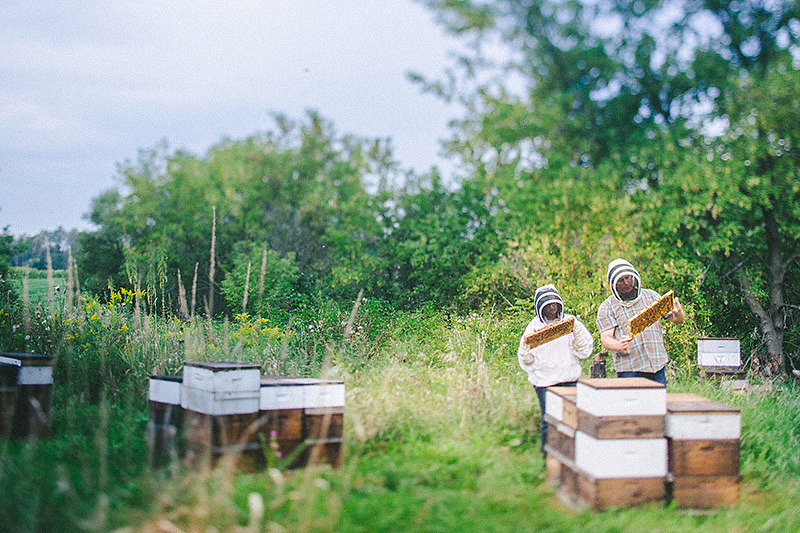The LocalHarvest Blog
29 Jun Mon 2015
Meet Beekeeper Kari Nobel

Welcome back to the LocalHarvest newsletter.
Beekeeper Kari Nobel loves it when customers approach her at the farmers market to talk about seeing honeybees in their gardens. "It's awesome to hear people being excited about bees!" More and more people are getting interested in bees and even cheer them on when they see them hard at work. Perhaps this is one small upside to bees' well-publicized challenges: bees are certainly no longer taken for granted.
Kari Nobel had not given bees much thought one way or another before she began dating a beekeeper over a decade ago. Now she is fully immersed in their world as she helps her husband Jonathon care for their 700 hives, sells honey at the farmers market and runs their retail operation, which includes a store on LocalHarvest. In the summer, the Nobels and their bees live in Michigan; in the winter they take the hives on semi-trucks down to the citrus groves in Florida. I asked Kari how the work had changed since she first got involved. She said commercial beekeeping now involves much more time-sensitive and high-stakes management of the mites that plague bees and can cause hives to weaken and die. "Nowadays we're constantly on the watch for mites. A bad situation can arise so much faster than it used to." The reason for the change, she believes, is that the bees' overall level of health used to be higher, so they could resist the mites more readily and infestations evolved more slowly. A variety of factors including different use of pesticides now seem to make the hives more susceptible to grave damage from mites. Meanwhile, the mites are getting stronger as they become tolerant of the treatments used to knock them back.
With so many complex and ongoing challenges, it would be understandable for beekeepers to be gloomy. The Nobels, though, seem to draw a lot of strength for the work from their passion for the bees. Kari likens the work to animal husbandry. "Just like a farmer would not want to see a cow get sick, beekeepers care about their bees. We're stewards of our bees, and it's our livelihood. We've chosen this. It's definitely a labor of love."
Knowing that many people are concerned about honeybees' well-being, I asked Kari how consumers could be involved. She said, "The best way to support beekeepers is to make sure you know where your honey is coming from. Honey bought in the grocery store is often imported from Brazil and Mexico. Looking for honey sourced in the U.S. creates a steady demand for domestic honey." Creating a more solid market seems like an excellent way to support beekeepers as they work to make a living under an increasingly challenging set of circumstances. If good, local honey is hard to find in your area, try LocalHarvest!
It will take a lot of work from beekeepers, researchers, and regulators -- and support from the rest of us -- to create a food system where bees can be returned to their former strength and fulfill their role in fully pollinating our food supply. In this, we can take a lesson from the bees themselves. I once learned that a honey bee will make just 1/8 teaspoon of honey in her entire lifetime, and for that small volume will forage for ten hours a day. Yet over the course of the season, a healthy hive will produce well over a hundred pounds of honey. That is a lot of 1/8 teaspoons coming together, and speaks to the power of a common purpose.
To hard work and pulling together, like and for the bees.
Until next time, take good care and eat well.
Erin
Erin Barnett
Director
LocalHarvest

